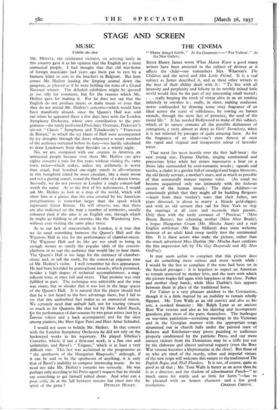STAGE AND SCREEN
MUSIC Fiddle-de-dee Ma. HEIFETZ, the celebrated violinist, on arriving lately in this country gave it as his opinion that the English are a most unmusical people. I had thought that that old war-horse of foreign musicians had years ago been put to rest by a humane killer or sent to the knackers in Belgium. But here comes Mr. Heifetz leading the limping animal down the gangway, as pleased as if he were holding the reins of a Grand National winner. The deluded exhibition might be ignored as too silly for comment, but for the reasons which Mr. Heifetz gave for making it. For he does not say that the English do not produce music or make music or even that they do not attend Mr. Heifetz's concerts—which would have been manifestly absurd, since the Queen's Hall was sold out when he appeared there a few days later with the London Symphony Orchestra, whose own contribution to the pro- gramme—the rarely performed Freischiitz Overture, Prokoviev's nit-wit " Classic " Symphony and Tchaikovsky's " Francesca da Rimini," in which the icy blasts of Hell were accompanied by icy draughts through the doors whenever a weary member of the audience retreated before its fury—was hardly calculated to draw Londoners from their firesides on a wintry night.
No, we are, compared with our cousins in America, an unmusical people because over there Mr. Heifetz can give eighty concerts a year for five years without visiting the same town twice—which makes, unless my arithmetic is worse than usual, four hundred one-night stands in all—whereas in this benighted island he must circulate, like a mere moon and not a glazing comet, round the fixed orbit of a dozen towns. Secondly, we do not possess in London a single concert-hall worth the name. As to the first of his indictments, I would ask Mr. Heifetz to look at a map of the world, which will show him at a glance that the area covered by his American peregrinations is somewhat larger than the speck which represents Great Britain. He will observe, too, that there are also indicated on the map a number of territories, usually coloured pink if the atlas is an English one, through which he might go fiddling to all eternity, like the Wandering Jew, without ever visiting the same place twice.
As to our lack of concert-halls in London, it is true that we do need something between the Queen's Hall and the Wigmore Hall in size for the performance of chamber-music. The Wigmore Hall and its like are too small to bring in enough money to satisfy the popular idols of the concert- platform or to seat the audience that would like to hear them. The Queen's Hall is too large for the intimacy of chamber- music and, to tell the truth, for the somewhat exiguous tone of Mr. Heifetz's violin. I well remember his first appearance. He had been heralded by gramophone records, which promised, besides a high degree of technical accomplishment, a mag- nificent tone, at once full and sweet. That promise was only fulfilled in part. The technique was admirable and the tone was sweet, but so slender that it was lost in the large spaces of the Queen's Hall. It is natural that the player should feel that he is not heard to the best advantage there, but I fail to see that this undoubted fact makes us an unmusical nation. We certainly need that unbuilt hall, not for touring virtuosi so much as for Quartets like that led by Herr Adolf Busch, for the performance of duo-sonatas by two great artists (not by a famous soloist and a hack accompanist) and for the elect among pianists, like Herr Egon Petri and Herr Artur Schnabel.
I would not seem to belittle Mr. Heifetz. In that concert with the London Symphony Orchestra he did not rely on the hackneyed works in his repertory. He played Sibelius's Concerto, which, if not a first-rate work, is a fine one and unfamiliar, and Ravel's " Tzigane," which is at least a very difficult one. This last was acclaimed in the programme as " the apotheosis of the Hungarian Rhapsody," although, if it can be said to be the apotheosis of anything, it is only that of Ravel's inability to compose interesting music. So we need not take Mr. Heifetz's remarks too seriously. He was perhaps only acceding to his Press-agent's request that he should say something to get himself talked about. And what can a poor critic do at the lull between seasons but enter into the










































 Previous page
Previous page